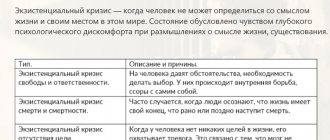Transitional age
The connection between this or that crisis and age in general is quite conditional, but one of the brightest and most noticeable periods occurs between 14 and 19 years. This is the same transitional age, which is associated with a huge number of social, psychological and physiological changes in the body. Puberty turns a teenager's life into continuous swings of emotions, and sometimes it is not so easy to deal with this. Among other things, it is at this time that growing children first begin to think about their immediate future and the time when they will have to grow up. There is no need to go far; even choosing a future profession and place of study at the age of 16-17 is an impossible task for many.
Adolescence is, in fact, the first adult crisis in a person’s life. And if in childhood a crisis is the complete destruction of the old and the construction of a new one, then in adults it is always some kind of choice and conflict of contradictions that no one will solve for you.
Children today spend most of their time in the school system and this makes the decision-making process even more difficult for them. Social pressure, endless instructions from your parents and the feeling that your own feelings and experiences are of no interest to anyone. As sad as it is, sometimes such situations lead to the most disastrous consequences.
But hormones and overwhelming emotions prevent teenagers from accepting reality and soberly understanding what is happening, otherwise they would easily accept the normality of what is happening and finally stop worrying about trifles. As a rule, during this period, young people often give up their usual hobbies and look for new ones, strive to isolate themselves from their parents and show their independence.
This kind of identity crisis is not just a lack of understanding of what to become when you grow up. Partly this is the full formation of personality and its assessment. And the point here is not only in the future profession, many face serious problems in accepting their body, which is rapidly changing. At the same time, you are searching for yourself in society and among the people around you. And here, for a growing child, a loving and understanding family that will accept him as he is is very important.
5. Imagine what you would advise a friend in such circumstances
A difficult situation may require difficult decisions. However, they can be almost impossible to accept, especially in a short time frame when we are overwhelmed and overwhelmed with emotions. There is a feeling that we are between a rock and a hard place.
Choosing a medical procedure, looking for a new place to live - whatever the decision, try to look at the situation from the outside. Imagine that you are giving advice to a close friend who is in the same position. This will help you at least partially distance yourself from emotions and make it possible to see which option looks the most reasonable.
Quarter life crisis
This crisis is often complained about between the ages of 20 and 30. Some find themselves at a crossroads after graduating from university, others are torn between starting a career and personal life. And many do not want to live on their own at all, because they feel good next to mom and dad, who easily solve all problems. In recent years, the time of entry into adulthood has noticeably shifted, and this has led to the fact that the previously known “crisis of 30 years” has imperceptibly decreased to 25, but this is still a very relative age.
To all this is often added the nervousness that has appeared against the backdrop of the widespread spread of social networks. It always seems to us that something is wrong with us, because if you believe the world of Instagram and Facebook, things are going much better with friends and peers. If you are familiar with this situation, remind yourself that any person’s account is precisely a selection of the best of the best, and in some cases, this best is also contrived or exaggerated many times over. Just try not to compare yourself with others, rather try to focus on achieving your own goals.
This crisis cannot be viewed as destructive, since, on the contrary, it opens the way for personal growth and allows you to rebuild your life according to your own ideals, and not those that were imposed from the outside.
The most common advice on how to survive this crisis most often comes down to Zen practices. Firstly, learn to plan and don’t try to do everything, secondly, accept the inevitability of mistakes, and thirdly, figure out what you are really interested in and what you would like to do in life. To some extent, this crisis is even useful, because it helps to put thoughts in order and finally make changes in life.
Actions of a man
We will also talk about female emotionality here.
It is important for a man to learn to listen to his partner. And not only listen, but also hear, and not consider her problems as something funny and insignificant. Representatives of the stronger half of humanity should take responsibility for their leisure time .
If possible, they need to surprise their woman, please her with small surprises, and arrange romantic meetings. She will definitely appreciate it, because any woman wants to feel desired and loved.
Middle age crisis
Unlike the previous crisis, which is based on fear of the future, this one, on the contrary, is associated with the past. One day a man wakes up and finds himself terrified as everything he has suddenly loses all meaning. It seems that the work of your whole life is boring and dull, love is a thing of the past, and the children have completely forgotten about you in the flow of their own affairs. It is this age that is often associated with a craving for expensive and meaningless purchases, affairs with younger partners, divorces and other attempts to regain long-gone youth.
A midlife crisis applies to people between the ages of 40 and 60, when a rethinking of everything that happened to a person before occurs. But it is not so easy to describe this crisis unambiguously. It can occur differently in different people, as well as occur at different age intervals. And if for some these thoughts become pleasant memories, for others they become a direct gateway to depression.
If the first two crises can be safely called periods of growth and change, then this is a classic crisis in the psychological sense. It brings with it negativity, depression, devaluation of oneself and one’s life, and serious thoughts about death. And the most important thing here is to try to extract something useful and productive for yourself from the current situation.
But there are also things that almost everyone experiences during this period. There is a strong sense of disappointment and a clear sense of mortality. In addition, age also manifests itself from a physiological point of view - more and more diseases develop, women begin menopause (something similar happens in the male body and is called andropause).
The most important thing in this crisis is not to miss its transition into depression; in this case, you cannot do without the help of a psychologist. In all other cases, the most important advice is to accept the changes that have come and learn to live in the proposed circumstances.
Anti-crisis PR
Anti-crisis PR
- these are actions that help maintain or restore the company’s reputation when situations occur that negatively affect the image of the brand, manager or employees of the organization.
In the most successful cases, an anti-crisis campaign can also increase awareness, reach and audience loyalty.
Objectives of anti-crisis communication:
1. prevent the spread of false interpretations of the situation; 2. spread positive information and restore balance in the media; 3. maintain and improve the image of a company or individual; adapt the agenda to changing market conditions; 4. eliminate the negative consequences of the crisis and restore reputation.
Electric scooters
After scooter drivers hit two children in St. Petersburg, many began to have a worse attitude towards the sharing of electric scooters and even asked for a ban on using them.
After a wave of negativity, companies reduced the speed of scooters and also banned parking in some places. Also, Urent, Whoosh and Citymobil presented a code of ethical driving and accompanied it with bright, visual posters.
In this situation, just like in the previous one, there were both supporters and opponents. Thanks to the creativity and desire of companies to bear responsibility and solve the problem, part of the negative audience has become more loyal to the problem. Thus, the crisis situation was resolved.
Form for registering for a consultation on the topic “Crisis situation”:
If you have any questions about the promotion:
“Crisis situation? Action "Psychological assistance in a crisis situation""
You can ask our psychologist on Skype online:
If for some reason you were unable to ask a question to a psychologist online, then leave your message here (as soon as the first free psychologist-consultant appears on the line, you will be immediately contacted at the specified e-mail), or go to the psychological forum.
“Crisis situation? Action "Psychological assistance in a crisis situation""
We are a single whole, and business is not the most important thing!
In 1929, the New York stock exchange crashed. The Great Depression that began after this very quickly reached Japan. All this led to mass layoffs.
Then Konosuke Matsushita made an unexpected decision that shocked all his companions and competitors. The head of Matsushita Electric addressed the company's workers and employees with a fiery speech: “We will not fire anyone! We will not cut anyone's salary! Now everyone and everyone must understand that we are one whole, and business is not the most important thing! Each of you must make every effort to ensure that our products are successful in the market.”
The company reduced production costs and production costs, and for some time business was no worse than before. But by December 1, 1929, sales had fallen by half. Overstocking began in stores. There was a threat of financial disaster.
Matsushita acted contrary to market demands. He said: “We are cutting production by half immediately, starting today, but we are not laying off anyone. We will reduce production not by laying off workers, but by giving them a shortened working week. They will receive the same salary for their work. However, all holidays will be cancelled. We will ask the workers to start selling off inventory in warehouses themselves.”
The workers rejoiced. Matsushita became their idol. Each of them began to devote several hours a day to selling the products of the factory where they worked. Due to the fact that production was halved, soon all stocks in warehouses were successfully sold out.
Tasteville
The crisis situation began with the publication of the article “Recipes for Family Happiness” with the participation of VkusVill buyers. Among them was a family of girls who said that they adhere to ethical veganism, sort garbage and recycle everything.
After the publication of the material, the heroines of the text began to receive death threats and insults. People with homophobic views began to criticize the article. Seeing this, Vkusvill decided to delete the article and apologize to readers for hurt feelings, and called the material itself a mistake by the authors’ staff. However, after this the company was criticized again. The company managed to anger absolutely everyone: with a text about a same-sex family - homophobes and conservatives, and with a response text - progressive and socially reflective citizens. As a result of all the negativity that fell on the publication, the family was forced to leave Russia and seek asylum in Spain.
This PR disaster will not affect sales at the moment, but in a sense it will devalue the brand for a certain segment of the audience, because it is the meanings, values and positioning that provide longevity to large brands.
Conditions for the campaign “Crisis situation: psychological assistance in a crisis situation”
You can take advantage of the opportunity to get 5 consultations with a 20% discount .
For 1 consultation: 2000 1600 rub. Total for 5 consultations: 10,000 8,000 rubles - for residents of the Russian Federation and the CIS
For 1 consultation: 40 32 Euro. Total for 5 consultations: 200,160 Euro – for other countries
The consultation is carried out on Skype with audio or video communication of your choice.
Topics you can address:
- age crises
- crises due to job change/loss
- difficult family situations
- relationship crises
- loss of meaning in life
The “Crisis Situation” campaign is conducted by psychologist Olga Repina:
In any life situation that raises questions in your mind, your consciousness narrows very much, and it can be difficult to see the variety of options.
The psychologist will give his professional vision of the situation. But the best thing he can do is give him the tools and help him find his own, most correct solution. Read more…










